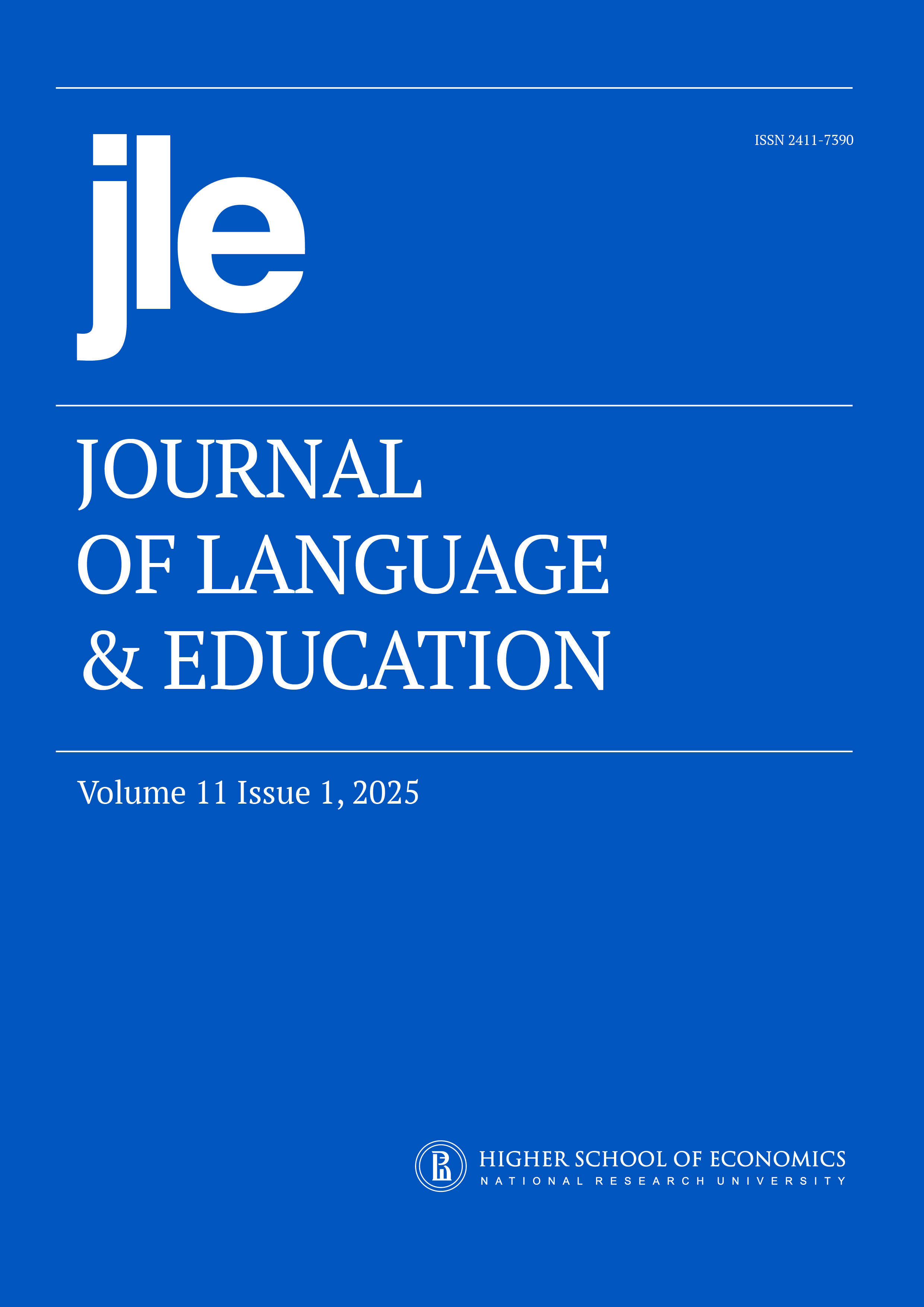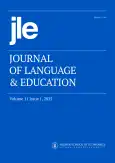The Relationship between Definitional Skills and Listening Comprehension: Preliminary Evidence from Preschoolers to School-Aged Children
- Авторы: Артусо К.1, Torelli E.2, Belacchi C.2
-
Учреждения:
- University of Genova
- University of Urbino Carlo Bo
- Выпуск: Том 11, № 1 (2025)
- Страницы: 46-55
- Раздел: Оригинальное исследование
- URL: https://bakhtiniada.ru/2411-7390/article/view/297410
- DOI: https://doi.org/10.17323/jle.2025.19867
- ID: 297410
Цитировать
Полный текст
Аннотация
Background: Definitional skills represent the ability to express words’ meaning using canonical formats (i.e., ‘a cat is a domestic animal that meows’). This complex linguistic production requires lexical, semantic, morphosyntactic, pragmatic and metalinguistic abilities, all implicitly mastered in language listening comprehension. Listening comprehension has a crucial role also in the cognitive linguistic mediated development, especially in promoting future reading comprehension. The relationship between definitional skills and listening comprehension is an underinvestigated topic.
Purpose: The aim of the present study was to explore this relationship in preschoolers and in school-aged children (first and third graders).
Method: Fifty-seven Italian children (age range: 44-106 months) were individually administered both a definition task, that requires to produce the definition of noun, verbs, and adjectives, scored by the Scale of Definitional Competence (Co.De. Scale), and the Test for Oral Reading Comprehension (TOR) that assesses textual and inferential listening comprehension via two brief stories.
Results: We found preliminary evidence of a bidirectional relationship between definitional skills and listening comprehension both in preschoolers and in school-aged children. Age explains a significant portion of variance of definitional skills (over listening comprehension); whereas definitional skills account for listening comprehension (in particular, textual comprehension).
Conclusion: The results are discussed in the light of the bidirectional link emerged from the analyses, promoting an initial reflection on the complex relationship between a metalinguistic ability (i.e., definitional skills) and listening comprehension processes both involved in school achievement.
Ключевые слова
Об авторах
Катерина Артусо
University of Genova
Автор, ответственный за переписку.
Email: caterina.artuso@unige.it
ORCID iD: 0000-0001-6938-3693
Италия, Genova
Elena Torelli
University of Urbino Carlo Bo
Email: caterina.artuso@unige.it
Италия, Urbino
Carmen Belacchi
University of Urbino Carlo Bo
Email: caterina.artuso@unige.it
Италия, Urbino
Список литературы
- Artuso, C., Lucaci, L., & Belacchi, C. (2024). The metalinguistic and metarepresentational attitude of early bilingual children: A study on definitional skills. International Journal of Bilingualism. https://doi.org/10.1177/13670069241284736
- Artuso, C. & Palladino, P. (2022). Working memory, vocabulary breadth and depth in reading comprehension: A study with third graders. Discourse Processes, 59(9), 685-701. https://doi.org/10.1080/0163853X.2022.2116263
- Artuso, C., Palladino, P. & Belacchi, C. (2020). Sensitivity detection in memory recognition: Interference control as index of taxonomic memory development? Memory, 28, 187-195. https://doi.org/10.1080/09658211.2019.1705488
- Artuso, C., Palladino, P., Valentini, P., & Belacchi, C. (2022). Definitional skills as a bridge towards school achievement. Sustainability, 14(1), 286. https://doi.org/10.3390/su14010286
- Belacchi, C., Artuso, C. & Palladino, P. (2022). Semantic long-term memory and verbal working memory: How does their relationship change with age? Cognitive Development, 62, 101185. https://doi.org/10.1016/j.cogdev.2022.101185
- Belacchi, C., & Benelli, B. (2007). Il significato delle parole. La competenza definitoria nello sviluppo tipico e atipico [Words’ meaning: Definitonal skills in typical and atypical development] (pp. 1-322). Bologna
- Belacchi, B., & Benelli, C. (2017). A mosaic is not a place where you go to see pictures: On the nature of definitions and the development of definitional skills. Rivista Di Psicolinguistica Applicata, 17(1), 71–91. https://doi.org/10.19272/201707701004
- Belacchi, C., & Benelli, B. (2021). Valutare la competenza definitoria. La Scala Co. De. in ambito clinico e nello sviluppo tipico [Assessing definitional skills in typical and atypical development] (pp. 1-208). FrancoAngeli.
- Benelli, B., Belacchi, C., Gini, G., & Lucangeli, D. (2006). ‘To define means to say what you know about things’: The development of definitional skills as metalinguistic acquisition. Journal of Child Language, 33(1), 71-97. https://doi.org/10.1017/S0305000905007312
- Bianco, F., Castelli, I., & Belacchi, C. (2022). Changes of meta-representational skills in ageing: First empirical evidence on the relation between metalinguistic competence and attributions of mental states. Journal of Language and Education, 8(3), 40-51. https://doi.org/10.17323/jle.2022.13868
- Cornaggia, A., Bianco, F., Castelli, I. & Belacchi, C. (2024) Assessing metarepresentational abilities in adolescence: An exploratory study on relationships between definitional competence and theory of mind. Frontiers in Psychology, 15, 1456432. https://doi.org/10.3389/fpsyg.2024.1456432
- Daneman, M., & Blennerhassett, A. (1984). How to assess the listening comprehension skills of prereaders. Journal of Educational Psychology, 76(6), 1372.
- Dourou, C., Gavriilidou, Z., & Markos, A. (2020). Definitional skills and preferred definition types according to age, gender, educational level and career orientation. International Journal of Research Studies in Education, 9(2), 29-49. https://doi.org/10.5861/ijrse.2020.5021
- Florit, E., Roch, M. & Levorato, M.C. (2014). Listening text comprehension in preschoolers: A longitudinal study on the role of semantic components. Reading and Writing, 27, 793–817. https://doi.org/10.1007/s11145-013-9464-1
- Gavriilidou, Z., Markos, A., & Dourou, C. (2022). The interaction of variables affecting definitional skills: Extending previous research on word definitions. Journal of Language and Education, 8(3), 65-80. https://doi.org/10.17323/jle.2022.12901
- Gini, G., Benelli, B., & Belacchi, C. (2004). Children’s definitional skills and their relations with metalinguistic awareness and school achievement. School Psychology, 2(1-2), 239-267. http://hdl.handle.net/11577/2446723
- Greimas, A. J. (1976). Sémiotique narrative et textuelle [Narrative and textual semiotics]. Pratiques, 11(1), 5-12. https://doi.org/10.3406/prati.1976.957
- Kendeou, P., Van Den Broek, P., White, M. J., & Lynch, J. (2007). Comprehension in preschool and early elementary children: Skill development and strategy interventions. Reading comprehension strategies: Theories, interventions, and technologies (pp. 27-45). Lawrence Erlbaum Associates Publishers.
- Kim, Y. S. (2015). Language and cognitive predictors of text comprehension: Evidence from multivariate analysis. Child Development, 86(1), 128-144. https://doi.org/10.1111/cdev.12293
- Lepola, J., Lynch, J., Laakkonen, E., Silvén, M., & Niemi, P. (2012). The role of inference making and other language skills in the development of narrative listening comprehension in 4–6-year-old children. Reading Research Quarterly, 47(3), 259-282. https://doi.org/10.1002/rrq.020
- Levorato, M.C. & Roch, M. (2007). TOR 3–8. Valutare la comprensione del testo orale. [Evaluating oral text comprehension]. Giunti O.S. Organizzazioni Speciali.
- McKeown, M. (1993). Creating effective definitions for young word learners. Reading Research Quarterly, 28(1), 17-31. https://doi.org/10.2307/747814
- Nippold, M. A. (1995). School-age children and adolescents: Norms for word definition. Language, Speech, and Hearing Services in Schools, 26(4), 320-325. https://doi.org/10.1044/0161-1461.2604.320
- Perfetti, C. A. (2007). Reading ability: Lexical quality to comprehension. Scientific Studies of Reading, 11(4), 357–383. https://doi.org/10.1080/10888430701530730
- Snow, C. E. (1990). The development of definitional skill. Journal of Child Language, 17(3), 697-710. https://doi.org/10.1017/S0305000900010953
Дополнительные файлы











